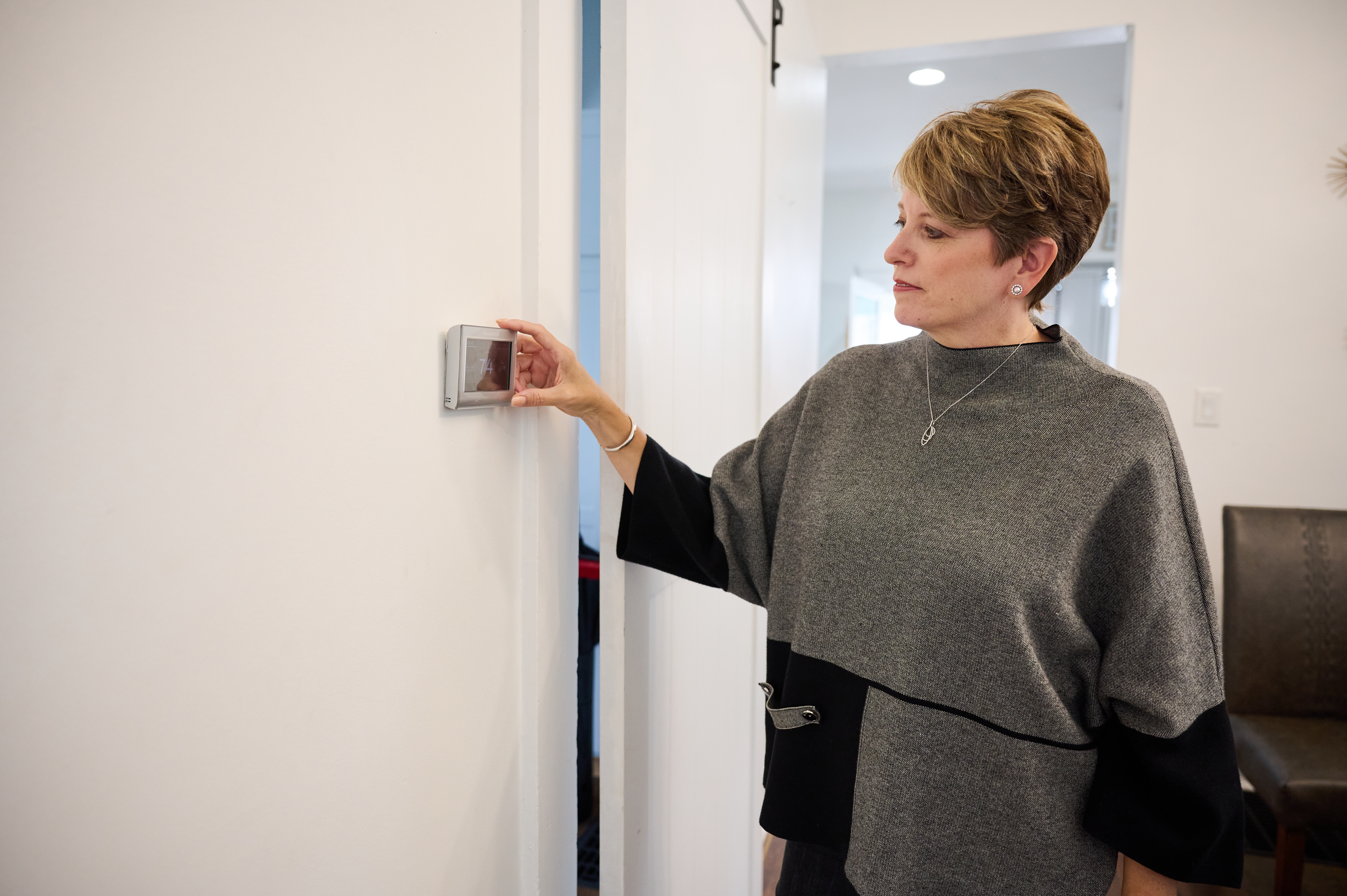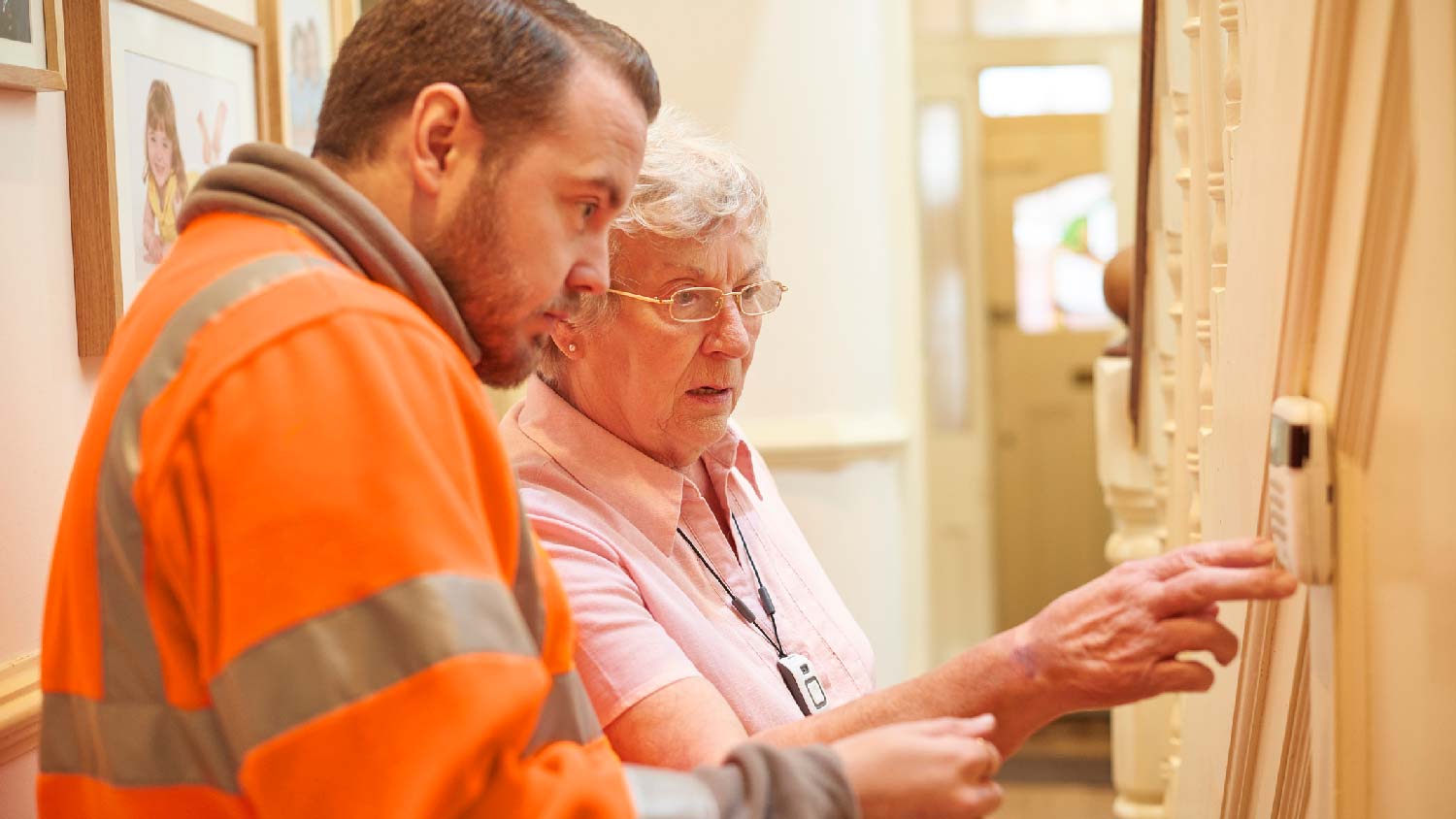
Your budget for moving an electrical panel depends on the type, labor, and more. Find out the average cost to move an electrical panel.
Avoid a shocking surprise by hiring an expert


From painting walls to fixing leaky faucets, there's always something to tinker with around the house. But, when it comes to heating and cooling, many homeowners wonder, do I need an electrician to replace a thermostat? The short answer is yes—hiring a licensed professional means a job done right, including meeting local requirements for safety. However, depending on your heating and cooling system's complexity, you might need to hire a local HVAC technician instead.
Hiring a local licensed electrician for a thermostat installation has many benefits that can make the process smoother and more reliable. Here are some key advantages.
Licensed electricians undergo extensive training to follow safety protocols during installations. They possess the expertise to identify and address potential hazards, such as damaged wiring, loose connections, circuit board failures, and improper previous installations.
Additionally, they are well-equipped to deal with any accumulated debris and dust on electrical components. Their professional approach significantly minimizes the chances of electrical accidents, which could result in shocks, fires, and even death.
Electricians are well-versed in local electrical codes and regulations. They ensure that the thermostat installation adheres to these codes, preventing any legal issues or safety violations down the road. Remember, non-compliance can lead to costly fines or needing to redo the work.
A correctly installed thermostat can significantly improve energy efficiency in your home. Electricians proficient in thermostat installation can calibrate the device accurately, optimizing its settings to minimize energy consumption. The result can lead to lower utility bills over time, offsetting the initial installation cost.
Many thermostats come with warranties, and some of these warranties may require professional installation for validation. Hiring a licensed electrician can ensure your warranty remains intact, providing peace of mind. Additionally, some pros offer warranties on their work, adding another level of protection for homeowners.
Professionals have the experience to complete the installation efficiently, saving you time and effort. You won't have to wrestle with complex wiring or troubleshooting, allowing you to focus on other tasks or enjoy the comfort of your newly installed thermostat sooner.
Get your HVAC system serviced and inspected at least once per year. For extra peace of mind, call in a pro twice annually: once before the hottest months of the year and again before the coldest time of year.

If your thermostat is part of a complex heating, ventilation, and air conditioning (HVAC) system, consider hiring an HVAC technician specializing in installation and maintenance.
Expertise: HVAC technicians have in-depth knowledge of HVAC systems, making them well-equipped to ensure that your thermostat integrates seamlessly with your HVAC system.
System compatibility: HVAC technicians can assess your HVAC setup and recommend thermostats compatible with your specific equipment. It ensures optimal performance and efficiency.
Efficiency optimization: A local pro can fine-tune your thermostat settings to maximize energy efficiency and comfort. The result is lower energy bills and a more comfortable indoor environment.
Warranty protection: Some HVAC systems and thermostats may require professional installation for validation. Hiring an HVAC technician ensures that your warranty remains intact, providing added protection.
Cost: If you’re wondering how much it costs to install a thermostat, an HVAC technician can be more expensive than an electrician per hour because of their specialized expertise. On average, an HVAC contractor charges between $50 and $150 per hour. A licensed electrician typically bills less, $50 to $100 per hour.
Limited scope: HVAC technicians primarily focus on heating and cooling systems. If your thermostat installation involves complex electrical work or is part of a broader electrical project, you may need to hire an electrician.
Simple installations: Hiring an HVAC technician might be overkill if your thermostat replacement is compatible with the existing wiring in your home and doesn't require making changes to the HVAC system.
In a nutshell, hiring an HVAC technician for thermostat installation can be a wise choice if you have a complex HVAC system, want to maximize energy efficiency, or need assistance with troubleshooting. However, it comes at a higher cost. Consider your specific needs and budget when choosing an HVAC technician or licensed electrician for your thermostat installation.
Here's how a professional electrician or HVAC technician typically approaches a thermostat replacement project:
Assessment: They begin by assessing your existing thermostat and HVAC system to determine compatibility and any potential issues.
Shut off power: They turn off the power at the circuit breaker to ensure safety during installation.
Removal: They carefully remove the old thermostat, taking note of the wiring connections for the new installation.
Wiring: The professional will connect the wires to the new thermostat according to manufacturer instructions and local electrical codes.
Testing: They test the new thermostat to ensure it functions correctly and communicates with your HVAC system.
Calibration: If necessary, they calibrate the thermostat for optimal performance and energy efficiency.
Final inspection: Before completing the project, they’ll conduct a final inspection to verify everything is functioning as expected.
While some homeowners may possess the skills and knowledge to replace a thermostat, it's essential to consider several factors before clearing a Saturday to do the job yourself.
Do you have a basic understanding of electrical circuits and wiring? Hiring a professional to avoid potential electrical hazards is best if you must frequently consult Google or YouTube for electrical advice.
Ensure the new thermostat is compatible with your furnace or HVAC system. Mismatched components can lead to inefficiencies or even system damage. Contact a local licensed electrician if you need clarification.
Do you have the necessary tools, including wire strippers, screwdrivers, a drill, and a voltage tester? If you don't own these tools or don't have experience using these items, consider calling a pro.
Are you aware of safety precautions when working with electricity? Turning off the power at the circuit breaker and using insulated tools are critical for your safety. When in doubt, seek professional installation.
Confirm if DIYing the installation cancels the warranty on your thermostat or HVAC system. If so, working with a pro will protect your investment.
While replacing a thermostat may appear straightforward, it involves electrical work and compatibility considerations for equipment that you should consider. Hiring a professional electrician or HVAC technician is the safest and most reliable option, ensuring correct thermostat replacement. Remember, getting your HVAC system inspected and serviced (if needed) at least once yearly is essential. To ensure efficiency, consider bringing in a pro twice a year before the hottest and coldest months. Stay warm or cool!
From average costs to expert advice, get all the answers you need to get your job done.

Your budget for moving an electrical panel depends on the type, labor, and more. Find out the average cost to move an electrical panel.

The cost to install a C-wire ranges based on materials and labor, but it only takes an hour or two. Here’s a guide on the project costs to expect.

Installing an outdoor outlet is a relatively affordable way to take your outdoor space to the next level. Find out the cost to install outdoor outlets

Discover the various types of circuit breakers, their unique features, pros and cons, and the best applications for each in this comprehensive guide.

Grounded circuits are happy (and safe) circuits, but what if you live in an older home with pre-grounded receptacles? Here are ways to ground without a wire.

Here’s what you need to know to reset an outlet without a reset button. Follow this guide for resetting an outlet in a snap.